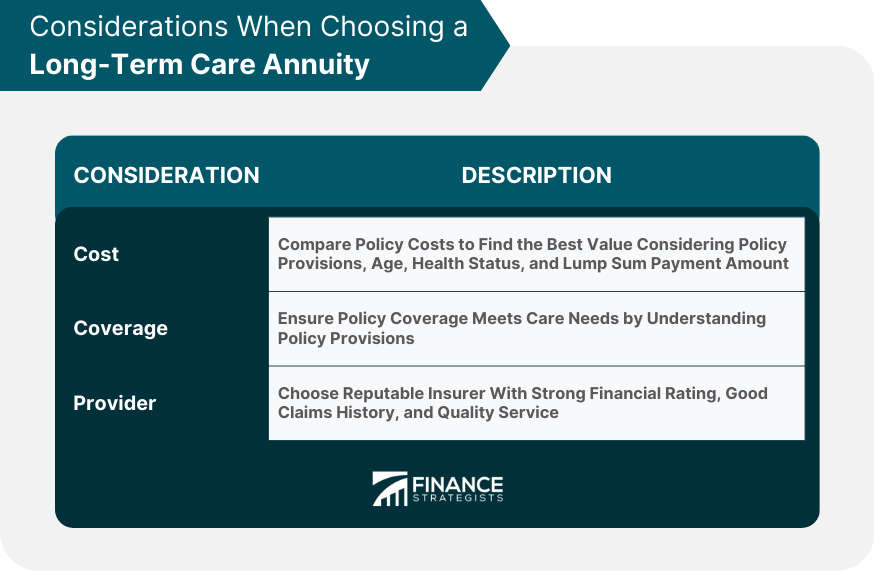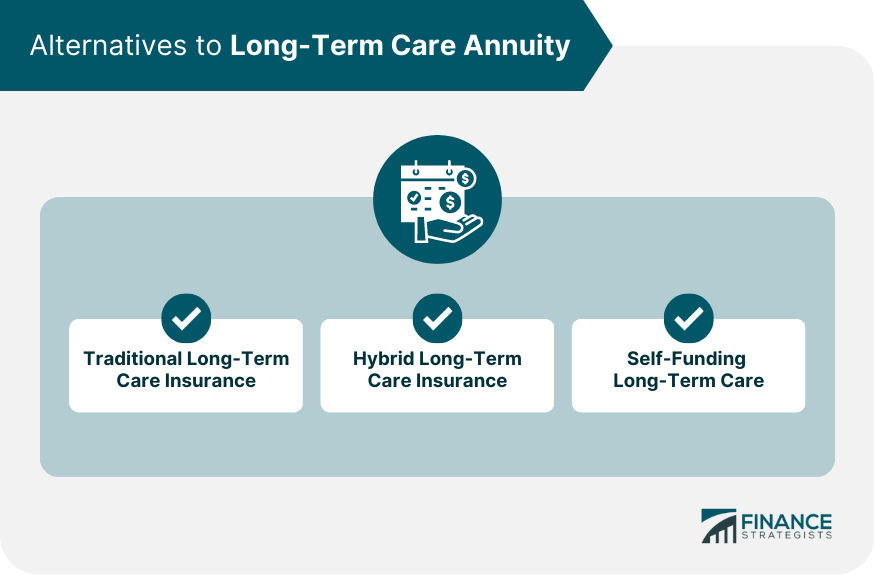A long-term care annuity is a hybrid financial product that provides a guaranteed lifetime income stream to pay for long-term care expenses. An individual can purchase an annuity with a lump sum payment and use the resulting income stream to cover long-term care costs, such as nursing home or home health care expenses. Long-term care annuities offer a combination of long-term care insurance and annuity benefits. They are designed to help individuals plan for the possibility of needing long-term care services in the future and protect their financial well-being. A long-term care annuity is an annuity that is designed to help pay for care expenses. It is a hybrid product that combines an annuity's benefits with care insurance's benefits. With this type of annuity, the annuitant makes a lump sum payment to the insurance company. In exchange, the insurance company provides a guaranteed lifetime income stream that can be used to pay for care expenses. A long-term care annuity provides a guaranteed lifetime income stream to the annuitant that can be used to pay for care expenses. The annuitant makes a lump sum payment to the insurance company. In exchange, the insurance company guarantees a tax-free lifetime income stream if used for qualified care expenses. The income payments can be fixed or variable, depending on the lump sum payment amount, the annuitant's age and health status, and the policy provisions. Like any financial product, a long-term care annuity has advantages and disadvantages. Advantages Provides a guaranteed lifetime income stream that can be used to pay for care expenses The income payments can be tax-free if used for qualified care expenses Can provide a source of income for individuals who have exhausted their other care insurance options Can provide a hedge against inflation as the income payments can be adjusted for inflation Disadvantages Requires a large lump sum payment upfront The income payments may not keep pace with inflation The annuity may not cover all care expenses The annuity may not be suitable for individuals with pre-existing health conditions When choosing a long-term care annuity, there are several factors to consider. The cost of a long-term care annuity can vary depending on the policy provisions, the annuitant's age and health status, and the lump sum payment amount. It is essential to compare the costs of different policies to find the policy that provides the best value for the annuitant. The coverage of a long-term care annuity can vary depending on the policy provisions. Understanding the policy's coverage and ensuring it meets the annuitant's care needs is important. When choosing a long-term care annuity, choosing a reputable insurance company with a strong financial rating is essential. The insurance company should have a good track record of paying claims and providing quality customer service. While a long-term care annuity can be a good option for some individuals, some may have better options. Alternative options for care planning include traditional care insurance, hybrid care insurance, and self-funding. Traditional long-term care insurance is a type of insurance policy that provides coverage for long-term care services. The policy pays for expenses related to long-term care, such as nursing home care, assisted living, and home health care. Traditional long-care care insurance premiums are based on age, health status, and the level of benefits selected. The coverage can vary depending on the chosen policy, including home care, assisted living, and nursing home care. Traditional LTCI policies typically have a waiting period before benefits can be received, known as the "elimination period." During this period, the policyholder is responsible for paying out of pocket for their long-term care expenses. Once the elimination period has passed, the policy will pay a certain amount per day or per month for covered long-term care expenses, up to a specified maximum benefit amount. Hybrid long-term care insurance is a type of insurance policy that combines long-term care coverage with life insurance or an annuity. This type of policy is also known as a combination or linked benefit policy. With a hybrid long-term care policy, the policyholder pays a single premium, which is invested in a life insurance policy or an annuity that also includes a long-term care benefit rider. The long-term care benefit rider provides coverage for long-term care expenses, such as nursing home care, assisted living, and home health care. If the policyholder does not use the long-term care benefits, the death benefit or remaining annuity value is paid out to their beneficiaries upon their death. This means that the policyholder can still receive some benefit from the policy even if they do not need long-term care services. Self-funding long-term care refers to paying for long-term care expenses out of one's own savings, investments, or other assets. This means that the individual is not relying on insurance coverage or government benefits to pay for their long-term care needs. Self-funding long-term care can be a viable option for individuals who have a significant amount of assets and are able to pay for their long-term care expenses without depleting their savings or other investments. It can also provide greater flexibility and control over the type and quality of care received. However, self-funding long-term care can be expensive. It may not be sustainable for individuals with limited assets or who require a high level of care for an extended period. Additionally, there is a risk that the cost of long-term care may exceed the individual's savings and assets, which could lead to financial hardship for both the individual and their family. Care planning is essential for individuals who want to protect their assets and avoid the financial burden of care expenses. A long-term care annuity can be a good option for some individuals as it provides a guaranteed lifetime income stream that can be used to pay for care expenses. When choosing a long-term care annuity, it is essential to consider the cost of the policy, the coverage of the policy, and the reputation of the insurance company. It is also important to consider alternative options such as traditional care insurance, hybrid care insurance, and self-funding. By planning ahead for care, individuals can ensure that they have the resources they need to maintain their quality of life and protect their financial well-being. Seeking advice from an insurance broker can help you make informed decisions that align with your long-term financial goals. What Is a Long-Term Care Annuity?
How Long-Term Care Annuity Works
Advantages and Disadvantages of Long-Term Care Annuity
Considerations When Choosing a Long-Term Care Annuity
Cost of Long-Term Care Annuity
Coverage of Long-Term Care Annuity
Providers of Long-Term Care Annuity

Alternatives to Long-Term Care Annuity
Traditional Long-Term Care Insurance
Hybrid Long-Term Care Insurance
Self-Funding Long-Term Care

Conclusion
Long-Term Care Annuity FAQs
A long-term care annuity is a type of annuity contract that provides the policyholder with a stream of income payments in exchange for a lump sum or a series of payments. The income payments are designed to cover the cost of long-term care expenses, such as nursing home care, home health care, and other forms of assisted living.
A long-term care annuity works by providing the policyholder with a guaranteed stream of income payments, which can be used to cover the cost of long-term care expenses. The annuity typically includes a rider that provides for an accelerated payment of benefits if the policyholder requires long-term care services. The rider may specify the conditions that must be met for the policyholder to qualify for the accelerated benefit payments.
The advantages of a long-term care annuity include tax-deferred growth of the annuity value, the ability to access the annuity value for long-term care expenses without penalty or tax liability, and the assurance of a steady stream of income payments to cover long-term care expenses.
Some potential drawbacks of a long-term care annuity include high fees and expenses, the potential for the annuity value to decrease in value over time due to market fluctuations, and the fact that the annuity value may not cover the full cost of long-term care expenses.
A long-term care annuity may be a good option for individuals with a significant amount of assets they wish to protect from the high cost of long-term care expenses. Additionally, those with a family history of needing long-term care or concerned about the potential cost of long-term care in the future may also consider a long-term care annuity. Speaking with a financial advisor or another qualified professional is important to determine whether a long-term care annuity suits your financial situation and long-term care needs.
True Tamplin is a published author, public speaker, CEO of UpDigital, and founder of Finance Strategists.
True is a Certified Educator in Personal Finance (CEPF®), author of The Handy Financial Ratios Guide, a member of the Society for Advancing Business Editing and Writing, contributes to his financial education site, Finance Strategists, and has spoken to various financial communities such as the CFA Institute, as well as university students like his Alma mater, Biola University, where he received a bachelor of science in business and data analytics.
To learn more about True, visit his personal website or view his author profiles on Amazon, Nasdaq and Forbes.















